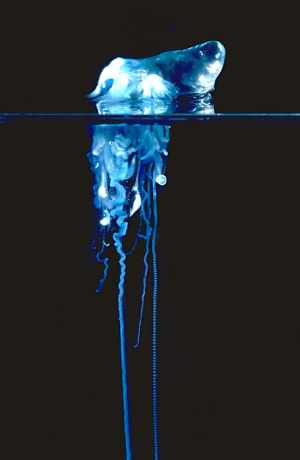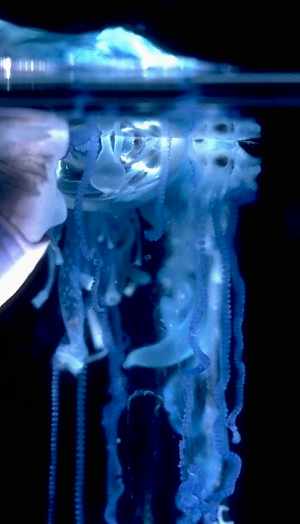

Physalia (Portugese man-o-war or Bluebottle)
PHOTO
Floating animal showing large flotation bladder and the specialised 'polyps' and trailing tentacles which hang beneath the bladder. Lower photo shows and enlarged section of the body beneath the water. Photos: Bill Rudman
Note: Messages on Porpita and Velella are also attached to this page.
Physalia is a Cnidarian [or Coelenterate] - a group of animals which includes the sea anemones, corals and jellyfish. One thing they all have in common are specialised stinging cells or nematocysts, which are often used to catch their prey. In Physalia they are used to catch fish, and to ensure the fish do not escape, the poison in the stinging cells is quite powerful. This is why they give us such a painful sting.
Physalia is a siphonophore, a specialised group of cnidarians in which each 'animal' is really a colony of highly specialised individuals. In Physalia, one individual forms a gas-filled float and the other individuals are specialised for feeding and digestion, or for reproduction, or to form the extremely long tentacles which contain the nematocysts which sting and capture their prey. In the lower photo part of the long stinging tentacles can be seen as a string of beads, each 'bead' containing a nematocyst. Other flask-like structures are the 'mouths' which secrete digestive juices and envelop captured food.
Bluebottles are found throughout the world and are usually only noticed when they are blown on to beaches during summer, upsetting our holiday plans. They can form great populations of animals in the open ocean and these 'blue fleets' often contain two other colonial cnidarians, Porpita and Velella. Porpita has a small transparent circular disc and many small tentacles radiating out around the edge, and Velella, whose common name is the 'by-the wind-sailor', has a more oval shaped disc with a prominent sail arranged obliquely along the disc.
A number of molluscs including the nudibranchs Glaucus atlanticus, Glaucilla marginata and the Violet Snails Janthina, are specialised feeders on Physalia and the other floating cnidarians.
Authorship detailsRudman, W.B., 2002 (April 23) Physalia (Portugese man-o-war or Bluebottle). [In] Sea Slug Forum. Australian Museum, Sydney. Available from http://www.seaslugforum.net/factsheet/physalia
Related messages
-
Physalia from Western Australia
From: Monika Stambergova, February 13, 2004 -
Velella velella
From: Glenn Nelson, May 10, 2002 -
What is it? From a school teacher in Los Angeles
From: Linda Slater, May 2, 2002
